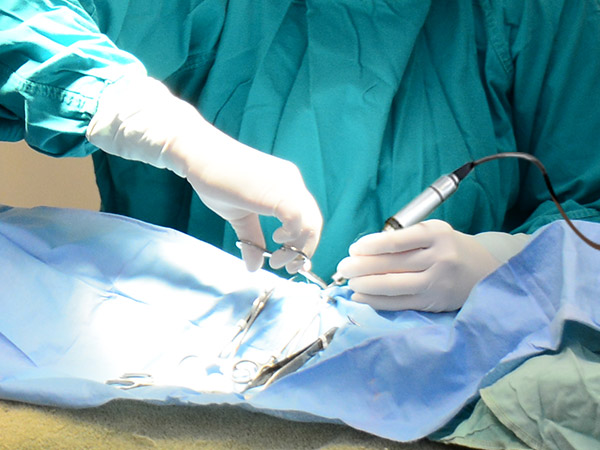Electrocautery Surgery for Pets
In our continuing efforts to provide you and your pet with the best and most advanced veterinary care possible, we perform electrocautery surgery when possible. Electrocautery surgery refers to the use of a specialized instrument during certain surgical procedures for your pet. Electrocautery instruments control bleeding during surgery through the use of heat conduction through a probe. This type of surgery has numerous benefits to your pet, including:
- LESS PAIN – Nerve endings are sealed as it moves through tissue resulting in your pet feeling less post-operative pain.
- LESS BLEEDING – Small blood vessels are sealed during surgery which allows the doctor to perform surgeries with less bleeding and greater precision.
- LESS SWELLING – There is less tearing or bruising of your pet’s skin and the unit also seals small lymphatic vessels to further reduce post-operative swelling.
All of these benefits means that your pet will have a greater level of comfort after surgery, fewer potential complications and a quicker recovery period when compared to traditional surgery. At Jefferson Animal Hospitals, we believe in providing the greatest level of care for our patients.
When your pet is admitted for surgery, we will take time to explain the procedure to you in detail. With our experienced surgery team and extensive AAHA compliance, you can feel confident that your pet will receive the best possible care before, during and after the surgical procedure.
Pre-Surgical Exam and Blood Work
Any pet coming to Jefferson Animal Hospitals for surgical procedures needs a thorough physical examination in your presence. It is very important that you meet with one of our veterinarians to discuss your pet’s health status and to be sure your pet is healthy to receive anesthesia. The pre-surgical services that we recommend for your pet are largely based on your pet’s age and physical condition. For example, a 4 month old healthy puppy, ready to be spayed, will have much different pre-surgical needs than a 14 year old cat that has periodontal disease and needs a dental prophy (cleaning). During this examination our veterinarian will evaluate your pet’s vaccination history, risk factors and general health condition. If you are planning to have your pet evaluated for surgery here at Jefferson Animal Hospitals, it will help you to be familiar with what is offered leading you to ask any questions that you might have with the doctor during the pre-surgical examination.
Anesthesia advanced monitors;including EKG, Pulse Oximetry, respiratory monitors and blood pressure monitors are used during all anesthetic procedures to ensure the safest possible outcome.
Advanced Pain Management using pre-emptive pain management, regional blocks and multi modal therapies.
Anesthesia and Your Pet
All routine surgical procedures are performed with the pet placed under full general anesthesia. Your pet sleeps painlessly through the entire operation. At Jefferson Animal Hospitals, the specific type of anesthetic used is tailored to the specific health picture and physical condition of your pet in order to make the surgery as safe as possible. Among the anesthetics available at our hospital is Isoflurane one of the most modern gas anesthetics available today.
Post Surgery
After surgery, each patient is carefully monitored by our veterinarians, trained staff members and medical technicians until he or she is fully awake and stable. No pet is dismissed from the hospital until we are satisfied that he or she is fully recovered from the anesthetic and stable from the surgery.
Discharge
When your pet is discharged, you will be given oral and written instructions explaining what to do and what to look for during your pet’s recovery period.

